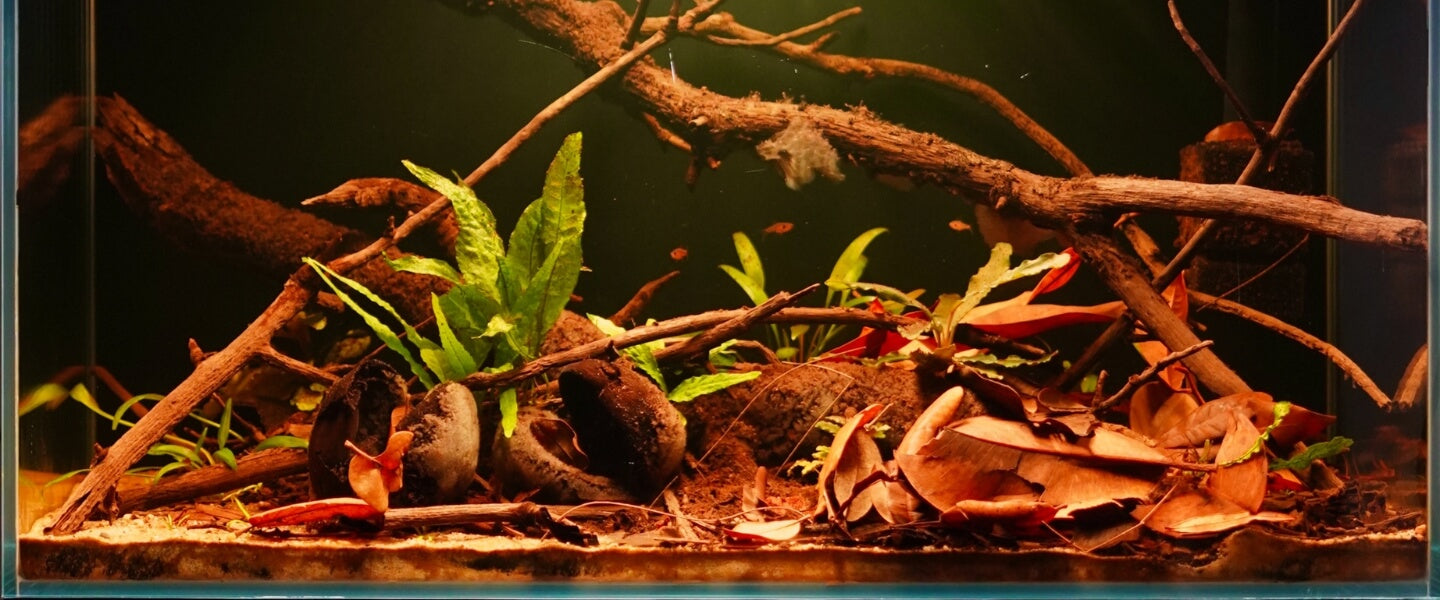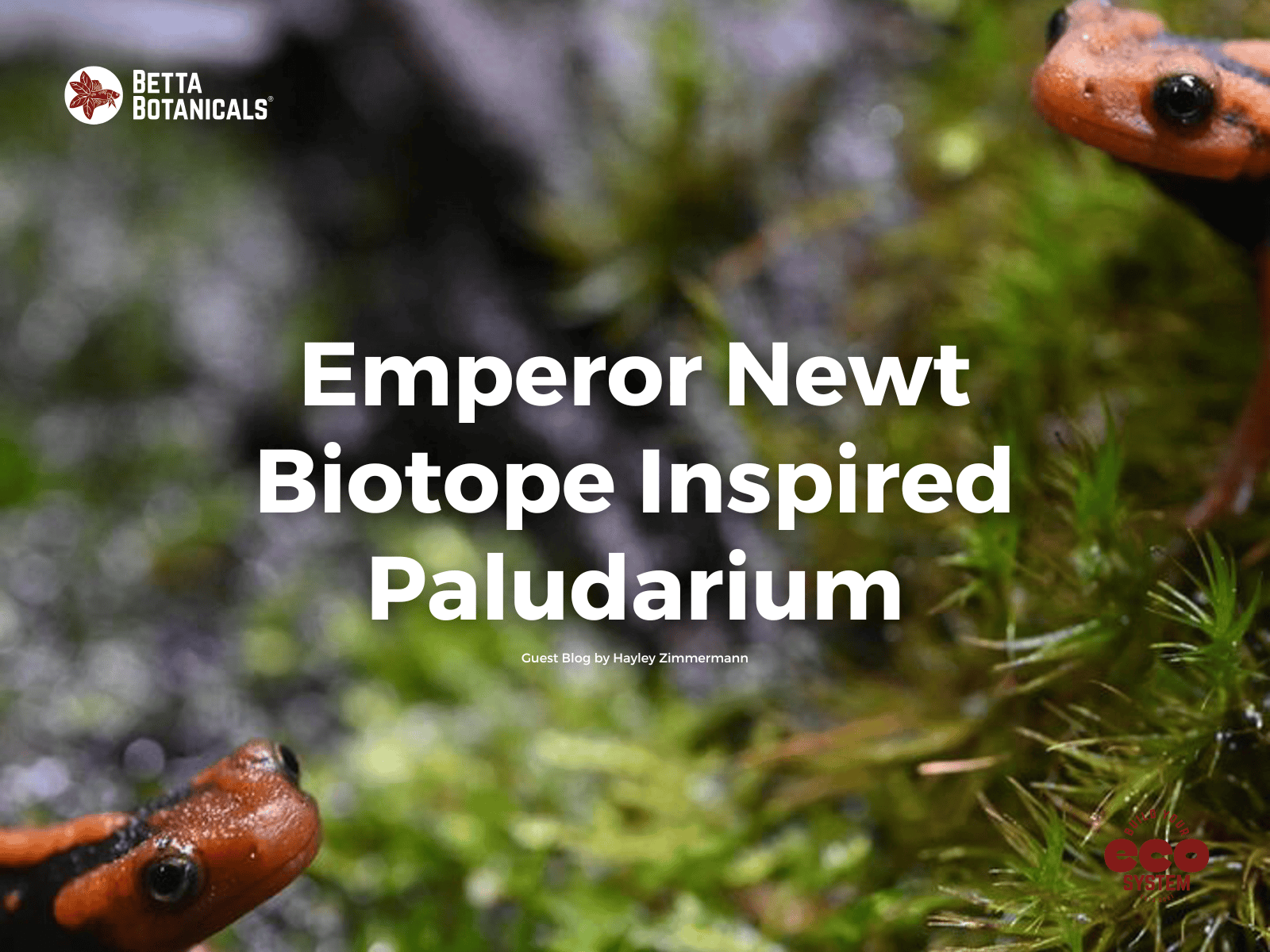Should You Remove Decomposing Aquarium Leaves in Blackwater Aquariums?

This jackfruit leaf has had the softer tissues decomposed or consumed.
By now, you have probably come to realize, or soon will, that botanical method and blackwater aquariums seem to rewrite the handbook of aquarium keeping. Substrate, filters, and husbrandy methods all have a unique twist to them. On our social media, we have recently discussed this profound methodology of not touching the substrate, and I would love to bring up another hotly debated topic: Should you remove the decomposing leaf litter materials and replace them with a fresh batch?
If you want the short answer, do not remove the old decomposing aquarium leaves!

A Jackfruit leaf at the early stages of decomposition in a botanical method aquarium.
Benefits and Uses of Dried and Naturally Fallen Leaf Litter
The aquarium botanicals we use in the hobby are naturally fallen... which is so important because it means the plants have pulled the naturally occurring sugars and saps, and other compounds out of the tissues, leaving behind a leaf that is largely just its structural cellulose fibers. By weight, leaves only contain 2% nitrogen on average when brown and naturally fallen. Technically just hemicellulose, cellulose, lignins, and other fibers. Yes, there are trace carbohydrates, vitamins, and minerals, but nothing compared to uneaten fish food or actual fish poop.
Which begs the question. Do decaying plant leaves increase ammonia levels? Not in our experience, and not in levels high enough to measure on our API test kit. There is one caveat: that the beneficial bacteria that naturally fallen leaves cultivate may produce ammonia... because everybody poops! But, because of the surface area of these leaves, algae will often consume that ammonia. Yes. Algae could be your friend here. Additionally, if there are thick biofilms on the botanicals that resemble gel coatings, anamox reactions can be performed in them, converting ammonia to hydrogen gas directly bypassing the nitrogen cycle.
A Betta Albimarginata in a botanical method aquarium.
Is Detritus Formed from Decaying Leaves Beneficial to Aquariums?
The cellulose and hemicellulose left behind by these broken-down aquarium leaves help to form our favorite part of botanical method aquariums. DETRITUS. Detritus helps to do many things in the aquarium, and I highly recommend reading the chapter on it in Diana Walstad's Ecology of the Planted Aquarium. This detritus contains very few compounds which might degrade the water quality, but when it comes to food sources for bacteria/fungi/crustaceans, detritus is a gold mine! ...a brown gold mine... You understand what I mean. Detritus helps lock up toxic metal compounds that may find their way into our ecosystems from tap water. It helps create an environment where ions and metals that benefit plant growth can be oxidized and transformed to bio-available options. This same detritus helps to increase the surface area within our aquariums, creating more space for beneficial bacteria to grow — thus improving ecosystem stability.
Detritus and Casuarina Cones in a botanical method aquarium.
Will Detritus Benefit an Aquarium?
Detritus can help process elements in the water column to make them more available to our plants, and detritus can bind with toxic metals and lock them away in the substrate. It's pretty cool stuff. If you've ever thought to yourself, "Who eats detritus?" the answer is the bacteria, fungi, and tiny microfauna living in the aquarium. It's not that detritus is inherently bad, but the source of this detritus needs consideration. Detritus formed via the degradation of leaves and seed pods — a source already devoid of compounds which degrade water quality — is best. But detritus can also be formed from the end product of fish and fish waste decaying. Deceased fish and fish waste are very high in nitrogen and contribute to an increased bioload of the aquarium. A sudden increase of Nitrogen from overfeeding has a larger impact on the ecosystem's stability than a handful of leaves added after a water exchange. In fact, one study found that Calcium was the most prevalent nutrient returned to the forest understory Ca (7.72 mg/g) > N (5.87 mg/g) > K (4.87 mg/g) > Mg (2.27mg/g) > P (0.66mg/g) > Na (0.41 mg/g) (Ndakara, Emmanuel Ofudjaye. (2012). Litterfall and Nutrient Returns in Isolated Stands of Terminalia catappa Trees in the Rainforest Area of Southern Nigeria. Ethiopian Journal of Environmental Studies and Management. 5. 10.4314/ejesm.v5i1.1.) 1 mg per 1 gram of weight is equivalent to ppm.

Betta Macrostoma in a blackwater aquarium with oak twigs and macarange leaves.
How do you Remove Detritus in an Aquarium? Should you?
Now, I understand that detritus is not for everyone, and I have to admit that once in a while I do remove a pile or two of it, and if you want to remove it, you can. Ways to get rid of detritus in the aquarium can be as simple as siphoning it out... but a cooler, more fun way is to use a type of bacteria. Our friend Purple Non-Sulfur Bacteria. Which consumes detritus both in the presence of light on the surface of your substrate, and deep in the sand bed in the realms where oxygen is too low for respiration to occur. It's fun stuff, and shrimp go crazy eating it when you get it growing on the surface of your aquarium. If you elect to siphon out detritus, best practice is a 3" x 3" section at a time — after all, the sudden increase in a stream's water flow will naturally remove pockets of detritus here and there. When we do this in our aquariums, it's important to follow the rhythms found in nature.
So there's the long-winded explanation. We recommend leaving the leaves to help sustain the ecosystem being cultivated. When it's time to replenish the leaves, simply add more on top of the old — this is what would naturally occur in nature. If you chose to take them out, that's okay too! Simply siphon them out or grab them with your hand, but don't take out too many!
When setting up your next aquarium, we recommend using leaf litter to help the process along. We've found it to be most beneficial.
I hope this blog post helps you take beh-tta care of your tanks!
Ben










Inspire your friends:
How to Set Up and Cycle A New Betta Fish Tank
Top Reasons Indian Almond & Catappa Leaves Keep Your Fish Healthy